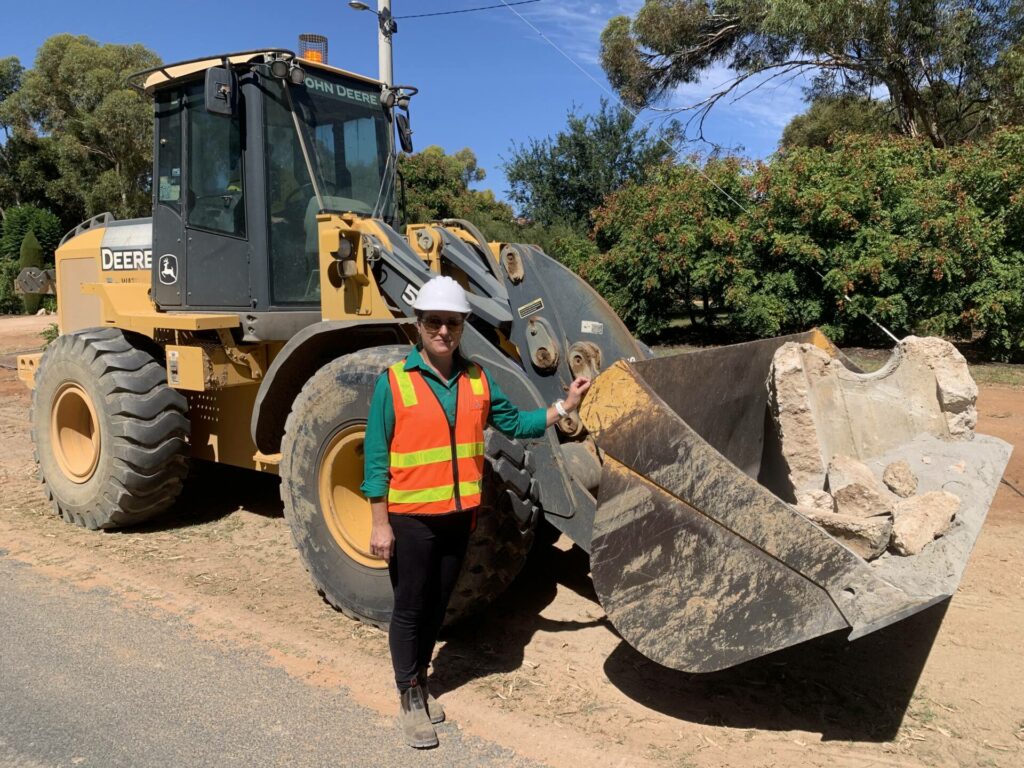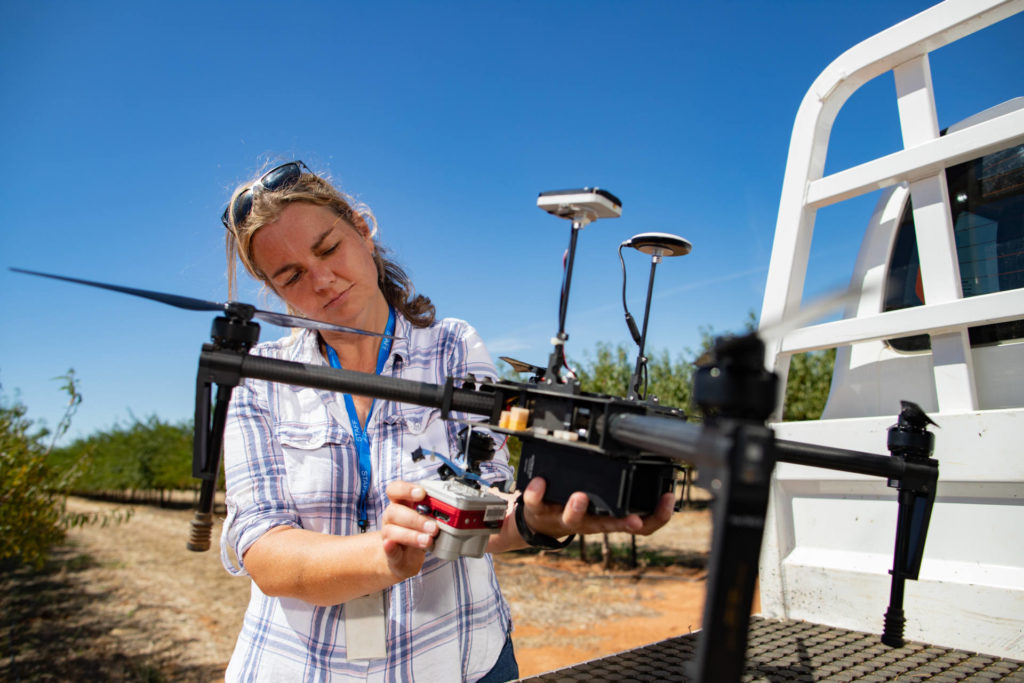
In celebration of National Agricultural Day 2024, Northern Mallee LLEN is highlighting the work of Matt Wilson, Senior Manager – SMART Farm Campus. Matt leads the charge in creating a dynamic environment for sustainable, cutting-edge agricultural practices to thrive. The SMART Farm is rapidly becoming a regional leader in horticulture training, blending traditional farming with innovative technology to prepare the next generation of agricultural professionals.
Matt’s influence extends to the success of the Northern Mallee Horticulture Immersion (NMHI) Project. This innovative initiative gives secondary students hands-on exposure to the agricultural world, providing them with invaluable insights into the diverse and growing opportunities in horticulture career pathways in our region. Through his efforts, Matt is helping to bridge the gap between education and industry, ensuring that future leaders are equipped with the skills to navigate the challenges of a rapidly changing agricultural landscape.
Can you describe your current role at SuniTAFE and what it entails?
As the Senior Manager – SMART Farm Campus, I oversee the daily operations and manage the $3.9M redevelopment CAPEX project, including constructing new facilities and upgrading existing ones. My role involves creating and implementing strategies that address skill gaps in the horticulture industry and promoting technological innovations. I collaborate with SuniTAFE education managers and staff to trial and evaluate innovative production methods, aligning with regional practices. Enhancing the student experience is a key focus, ensuring support services are accessible from initial enquiry to graduation. I engage with local horticulture stakeholders to support the development of SuniTAFE’s training facilities and resources.
Additionally, I present initiatives to SuniTAFE’s board and engage with industry and new cohorts to understand job and career opportunities, particularly in STEM and entrepreneurship. I also work with new and existing partners in the design and facilitation of farm assets, fostering growth and innovation in horticulture and agriculture training.
Can you share a brief overview of your career path? What sparked your initial interest in pursuing a career in horticulture?
My career path began in music, with a Bachelor of Music (Jazz Faculty) at Adelaide University. However, I eventually returned to my passion for horticulture, having grown up on a farm in South Australia’s Riverland. My early experiences included a two-year apprenticeship in horticulture, working on an almond orchard and in a vine and citrus nursery, as well as various roles in grape harvesting and irrigation management.
During the mid-nineties, I obtained a job with Loxton to Bookpurnong Local Action Planning (LAP) in Natural Resource Management. In this role, I coordinated irrigation management courses with Primary Industries & Resources of South Australia (PIRSA), successfully delivering these courses to 80% of the irrigator population within the Riverland. Later, I worked as a Land & Water Management officer with Central Irrigation Trust, managing water trade, GIS mapping, and property surveying. I also organised the first irrigation efficiency expo in the Riverland. In 2004, I moved to Mildura and worked with several water authorities, including Lower Murray Water, where I spent 15 years in various roles such as compliance, customer service, and GIS mapping.
More recently, I served as the Water Portfolio Manager for Select Harvests Limited, managing a $150M portfolio for 17 farms across three states. I have been in my current role at SuniTAFE SMART Farm for just over a year.
What kind of projects or initiatives are you currently involved in that promote the growth of horticulture/agriculture in the region?
Currently, I am involved in several projects and initiatives that promote the growth of horticulture and agriculture in the region. The redevelopment of the farm includes introducing new and existing commercial crops, installing new facilities like Protected Horticulture, and integrating various Ag-Tech equipment. These efforts have transformed the farm into a centre of excellence and a regional training facility, highlighting the horticulture industry and career opportunities in Agribusiness and Digital Literacy. Our goal is to provide a training platform that emphasises best management practices and the latest technologies to nurture emerging leaders in the industry.
Additionally, SuniTAFE is actively involved in the Northern Mallee Horticulture Immersion Project (now known as the Northern Mallee Horticulture Immersion Program) in partnership with Northern Mallee LLEN and Chaffey Secondary (Lead School) as well as Merbein P10 College, Mildura Specialist School, Red Cliffs Secondary College and Irymple Secondary, Industry Partners, Associations, Government Bodies and University. This initiative is crucial for promoting a new generation of horticulturalists by exposing year nine secondary students to the vast opportunities within the horticulture industry. It highlights career pathways and training opportunities, from VDSS to university degrees, and facilitates work placements, traineeships, and apprenticeships for students.
How do you see the role of technology and innovation shaping the future of horticulture and agriculture? What new practices or technologies are you most excited about introducing or promoting in your work?
Technology and innovation are crucial for the future of horticulture and agriculture, especially given the significant population growth from 3.5 billion in the 1970s to over 8 billion today. With natural resources like water depleting in many parts of the world, it’s essential to adopt new technologies that allow us to produce more with fewer resources.
I am excited about several new practices and technologies in my work. One example is the Modular Farming Unit, which features full environmental control and vertical cropping. This unit can become fully self-sufficient, producing its own water and potentially operating off-grid using solar energy. Such innovations represent the future of farming, where sustainable practices are vital, and the ability to grow more food with less resource use is increasingly important.
Additionally, advancements in netting structures, robotics, artificial intelligence, and autonomous vehicles are thrilling, with many of these technologies currently being trialled at the farm.
How important do you believe educational programs are in shaping the future of the horticulture industry?
Educational programs are vital for the future of the horticulture industry. The SMART Farm provides a first-class classroom environment and a quality farm where students gain real-life experiences from industry experts. As we move into an era of advanced technologies, we need a well-educated and industry-qualified workforce to develop, use, understand, and interpret these new technologies, improving farming practices for the future.
Can you tell us about your involvement with the NMHI Project (during your tenure with Select Harvests and currently at SuniTAFE)?
During my time with Select Harvests, I assisted in coordinating industry field visits for student participants in the Northern Mallee Horticulture Immersion Project. Students were able to visit the large Almond Processing Facility located at Wemen, where they got to see the Cogen H2E Facility that burns almond husk to generate power for at least 80% of the facility. They also observed the whole processing chain from entry to end products and packaging. The students also got to visit one of the largest Almond Farms at Piangil, where property managers explained the irrigation system, irrigation scheduling equipment, and harvesting machinery. I was also initially involved with talks around the establishment of the Horticulture Immersion Project prior to COVID.

Currently, at SuniTAFE, I am involved with the NMHI Program, where secondary students participated in an industry visit to SuniTAFE’s SMART Farm campus. The Northern Mallee Horticulture Immersion Program aims to show secondary students with an interest in farming, science, engineering, and emerging technologies the many horticultural career pathways they can take locally. The students are given a tour of the farm, a demonstration of key technologies used at the SMART Farm campus, and presentations on the pathways they can take to grow a career in Horticulture.
Which aspects of the NMHI program do you believe have the greatest impact on students and professionals in the industry?
The Northern Mallee Horticulture Immersion Program’s greatest impact lies in its ability to connect secondary students with the horticulture industry and further education. This connection provides students with numerous career pathway opportunities and helps address the skills shortage in the industry. Many students who previously had little, or no knowledge of horticulture now have their eyes opened to the possibilities, with many considering careers in horticulture or agriculture. This exposure is crucial for inspiring the next generation of industry professionals and ensuring a well-equipped workforce for the future.

What would you like to convey to the community and stakeholders about the importance of supporting the continued growth of the NMHI program?
Supporting the continued growth of the Northern Mallee Horticulture Immersion Program is crucial for our community and stakeholders. The horticulture industry generates nearly $2 billion annually for the local Sunraysia economy, making it the lifeblood of our region. There are many job opportunities that require skilled professionals, and the Northern Mallee Horticulture Immersion Program plays a vital role in filling this skills gap. By fostering a new generation of industry leaders, the program ensures the long-term viability and sustainability of the horticulture industry, benefiting our economy and community for years to come.
What advice would you give to someone who is just starting their career in horticulture or agriculture?
For someone starting their career in horticulture or agriculture, my advice is to embrace the vast opportunities available. The industry is no longer just about driving tractors or picking fruit. It offers a wide range of specialized roles, including agronomists, horticulturists, technicians, mechanics, electricians, irrigation specialists, harvest contractors, IT professionals, human resources, processing, quality assurance, exports, marketing, economists, water managers, accountants, and project managers, among others. Explore these diverse career paths and find your niche, as the industry can take you anywhere and offers numerous opportunities for growth and development.




